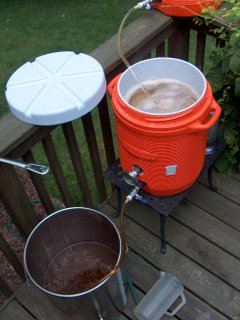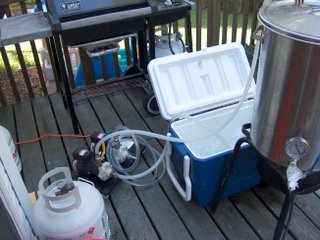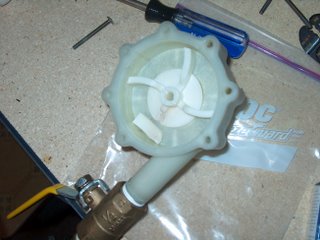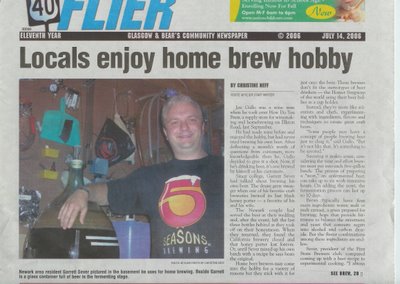Wednesday, July 26, 2006
A personal best...
Now I must wait for fermentation to commence and subside so I can mango it in the secondary... can you hear the tropical music playing?
Monday, July 24, 2006
Another weekend gone...
Marlana Gallo for being so hospitable once again. We had a good turnout of
ten to twelve folks, if I remember correctly, including two newcomers. Lots
of good beers to be had, including Hank's debut of "Cheap-@$$ Porter", which
I really enjoyed. My raspberry wheat had more takers than I was expecting,
and Marty liked it enough that he said he'd like to see the recipe... a much
better reaction than my Peated Scottish ale in March. Joe brought out a
peach brandy that tasted like white lightning – took your breath away and
burned all the way down. I cut out around 9:15pm so I could get home and
spend some time with my wife and to make sure I didn't get too carried away,
but I think everyone had fun.

Yesterday I brewed 10 gallons of beefed-up Amarillo Pale... OK, more like 9
gallons plus a gallon of trub... I may end up adjusting with some make-up
water in the secondary fermenters. This batch was slightly higher gravity
with about 33% more hops (11oz for 10gal). I tried to keep the calculated
IBUs the same, but moved the hop loading around – 1.5oz of first wort hops,
heavy late additions, and double the amount of dry hops. It was fermenting
away this morning when I checked, so I think all is well.

The new fittings on my pump skid and water filter worked beautifully! No
leaking, spraying, or trouble to be found... until a piece of ice got sucked
up into the pump inlet hose.
Story time! Many months (12+) ago when I was cleaning and rebuilding these
pumps, I knocked one of the impeller assemblies off the workbench and it hit
the concrete floor with an unceremonious thud... and snapped off one of the
4 impeller spokes. I ended up super-gluing it back on, and with some
trepidation placed it in my water recirc pump knowing that it would be
lighter duty than the wort pump AND I didn't need to worry about any of the
glue chemicals getting into something that would end up in someone's body...
And for the past year or so it has behaved beautifully. Well let me tell you
- when that ice chunk got sucked into the pump and hit the weaker impeller
spoke... SNAP! The pump started making all kinds of hellish noise. Long
story short, I managed to nurse the pump through it and got the job done,
cooling my 10 gallons of wort down to 72 degrees in about 35 minutes... (20
minutes of hose, 15 minutes of ice water recirc). Not too bad considering
our ground water temperature is 80 degrees at the moment.

Now the question becomes what to do with my water pump? Do I try to
superglue it back on, or do I leave it out and let the other 3 spokes just
do their thing? That will put the impeller off balance, but so could a big
old glob of glue... Not sure what I'm going to do.
We peeled, pureed, and froze the 7 mangos Donna got at the farmer's market
in preparation for Wednesday's brew – a mango wit. I'll thaw and pour the
puree into the secondary and rack the wit ontop of it. Donna's pretty
excited about this one – I'm definitely curious to see how it'll turn out.
She even designed the somewhat risque tap handle label - entitled "Mango
Mama Wit". You all will have to come to my house to see this one once it's
ready...
Thursday, July 20, 2006
The most expensive lesson of all...
Imagine, if you will, a system that knows how long it takes to heat up 6 gallons of mash at 1.15 qt/lb, or 10 gallons of sparge water, and actually begins pre-heating to accomodate that anticipated time lag (minimizing the overall brew cycle time)... That can take a stock ProMash recipe and associated mash cycle and control to it (including step times) with minimal manual intervention... That maintains mash temperature within half of a degree... etc. That's really the kind of functionality I want out of an automated brew sculpture.
I guess when I really think about it, I really am looking for a system that has automated and intelligent MASH functionality - I don't intend on automating anything on the boil side of the system. Once my wort is in the boil kettle, I want things to essentially be manual (adding hop and spice additions, cooling, racking, etc).
When thinking through what it would take to design and build this, I've come to realize how much from my formal university training has been lost in the past 10 years - and quite honestly it makes me dismally sad. I think back to the sheer volume of things I learned at Georgia Tech, and how much I've actually retained, and I can't help but feel remorse - Tens of thousands of dollars and nearly five years wasted. OK, not wasted - I have a very good job and make a very good living, but I use none of the things that my education prepared me for. Here's a list of the things I COULD use in building my brew sculpture system that I don't remember anymore:
- Heat and mass transfer - calculating fluid flows and pipe losses, heat required for step mashes, heat losses through pipes, heat pickup from HERMS coil, etc. This is the fundamental basis by which everything else is developed. Without that knowledge, your only hope is empirical models.
- Physics (Electromagnetics) - Circuit design (pure and simple). How much money am I going to pay for off-the-shelf circuits that I could have done myself if I remembered what a RC vs. RL vs. RLC circuit was, conditioning input signals, stepping voltage / current, etc. I was DAMN GOOD at this stuff in college, and now I feel like a big idiot looking at circuit diagrams.
- Process Control - Predictive model control, direct digital control, cascade control, you name it - I can't do any of this anymore. Hell, I don't remember enough of my heat and mass balances to actually develop the equations I would need for a model, let alone actually use it for process control! God I suck.
- Calculus and Differential Equations - How in the world are you supposed to solve the equations associated with all of the modeling above if you can't even remember the methods, tools, and theory? I could probably differentiate a simple algebraic equation if I had to, and MAYBE integrate one, however if you threw in a COS(), SIN() or "e" in there, I'm totally hosed... and let's not even mention DiffEQs. I couldn't solve one if my life depended on it anymore.
- Numerical Methods - Computers don't scratch out solutions on paper, they use complex methods that take advantage of their incredibly fast computation abilities... but in order to effectively use numerical methods, you still need to know how to do item (4).
I spent so much time and energy trying to become a Chemical Engineer, to aquire the knowledge one would need to do all that, only to graduate and never use it - and hence lose it. I have no doubt that I could probably re-learn a good portion of it if I sat down with my textbooks over the next year and teach it to myself again, and it may come to that - But it still upsets me to think that it is even necessary.
Use it or lose it. It's as true as it is trite... And if you spent nearly $100K to get it, losing it is just plain stupid.
Meeting tomorrow night - July 21st
Next door, State Line Liquors is having a beer shindig too - they are auctioning off some good beers, and doing some other stuff that I don't have the details for.... so we may have some folks wandering over to HDYB from that as well!
Sunday, July 16, 2006
Beating the heat...
 I finally got around to getting some stuff to move the potentiometer on my stir plate outside of where it was before. Reason being is that it is old technology, and it develops a hell of alot of heat while the stirplate is on. that heat in turn translates into heating the starter on the stirplate... much more than you would think. I have got to bed before with the starter at 68 degrees and woken up with it over 80... whoops! At any rate, I got a standard old electrical outlet box to test it out with, used some 14 gauge wire I had lying around, and I'm currently running a test downstairs with water to see how much the temperature rises (if any at all). I'm expecting it to be basically zero.
I finally got around to getting some stuff to move the potentiometer on my stir plate outside of where it was before. Reason being is that it is old technology, and it develops a hell of alot of heat while the stirplate is on. that heat in turn translates into heating the starter on the stirplate... much more than you would think. I have got to bed before with the starter at 68 degrees and woken up with it over 80... whoops! At any rate, I got a standard old electrical outlet box to test it out with, used some 14 gauge wire I had lying around, and I'm currently running a test downstairs with water to see how much the temperature rises (if any at all). I'm expecting it to be basically zero.In addition to that, I bought some new brass fittings at Home Depot to try to make my ice water pump recirculation loop less leaky. Its been a bane of my 10 gallon summer brews for over a year now - time I try out some new fittings and get rid of the leaking. The water spraying everywhere is more of an annoyance for most things... unless that nasty hose water happens to spray into your cooling wort!!! Anyhoo, I'll let you guys know how it goes next weekend. I'll take some pics to upload to the blog... not sure I've ever put my pump skid and ice water recirc loop on here before...
Oh yeah... Next couple brews:
- Amarillo Assault Pale Ale (same as previous amarillo but about 2x the hops!!!)
- Scottish 80/-
- Scotch Ale
- Abbey Dubbel
Thursday, July 13, 2006
Thursday suprise...
Wednesday, July 12, 2006
Lessons Learned
That has prompted me to enumerate a list of things learned in the past 3 or 4 months. Some are humerous, and others you will probably groan at... either because you found this out the hard way too, or you just know its a bad idea to begin with.
- Triple-check your bittering addition quantity. There is almost NOTHING you can do to correct an under-bittered beer and have it turn out OK.
- Boiling 1oz of hops in 1 gallon of water with the hope of correcting the previous mistake will not get you what you want... In fact it will smell like feet, overcooked vegetables, and a host of other things that you definitely don't want to add to your beer.
- Fermenting 10 gallons of high gravity (1.078) beer in a demijohn is a bad idea, unless you like that solventy-hot taste... That's alot of sugar and it builds up alot of heat - which is damn near impossible to chill with a glass jar that big.
- The wet T-shirt / dish towel trick really does work for dropping carboy temperatures.
- I HATE using an immersion chiller in summer. The ground water temperature is too high to effectively chill past 110 deg F.
- Saison yeasts like it hot - Like minimum of 75 degrees hot. They'll crash way early (like 1.030) if you don't let them hit the mid 80s toward the end of their fermentation.
- A year-old smack pack of Ringwood Ale (Wyeast 1187) is not going to work. Forget about it.
- Whole hops are the bomb. I've got way too many pellet hops to get rid of now that I can use whole hops.
- I simply must do more first wort hopping.
- Whirfloc is supposed to be used less than 10 minutes from the end of your boil, NOT 15 or 20 like most homebrew stores tell you.
- I really REALLY want a stainless steel open fermenter so I can start top-cropping yeast. Luckily the wife is starting welding classes next Tuesday, so in a year that might be possible.
That and so many others... I've got a whole lot to learn.
EDIT:
 I figured I'd take a picture that embodied several of these learnings. First, note the demijohn on the left - 10 gallons of (soon to be) oak-aged vanilla porter... source of bullet #1 through 4 and 8. The right hand side is 1/2 of the batch of Horizon Bitter (the other half went home with Mike Castagno, another club member), an english bitter brewed with all-horizon hops, and source of comment number #7 and 10. That thick yummy kraeusen of Ringwood Ale yeast is just BEGGING to be top cropped, alas I cannot in a carboy - SUCKS!!! I've got a killer Iron Hill Pig Iron Porter recipe that could easily be brewed with that fat layer of bitchin' biomass.
I figured I'd take a picture that embodied several of these learnings. First, note the demijohn on the left - 10 gallons of (soon to be) oak-aged vanilla porter... source of bullet #1 through 4 and 8. The right hand side is 1/2 of the batch of Horizon Bitter (the other half went home with Mike Castagno, another club member), an english bitter brewed with all-horizon hops, and source of comment number #7 and 10. That thick yummy kraeusen of Ringwood Ale yeast is just BEGGING to be top cropped, alas I cannot in a carboy - SUCKS!!! I've got a killer Iron Hill Pig Iron Porter recipe that could easily be brewed with that fat layer of bitchin' biomass.I am hoping that the hot flavors in my porter will chill with time, and that the oak and vanilla will at least mask if not aid any deficiencies in the hopping and temperature control arena. Last batch I made was "too hoppy" anyways for what I was shooting for, but I certainly didn't mean to undershoot the IBUs by about 20. Mike Castagno brought over some of the only real cure for an underhopped beer, although I haven't added it yet - and will probably only adjust 10 IBUs instead of the full 20.
Sadder than that time I had pumpernickel lager
Snip: Energy beer, a fusion of traditional ale and caffeine, is the latest craze to hit the beer industry.
Last week SAB Miller announced it would buy McKenzie River Corp.'s Sparks, a caffeinated alcohol malt beverage with ginseng, guarana and taurine.
The orange-colored brew was the first of the new energy beers to hit the market and has been credited with spawning a new breed of beer and opening a new market for beer brewers worldwide.
See full article here.
Tuesday, July 11, 2006
Herbs, Man II
Jane Hautanen (Jane Doe)
Saturday, July 01, 2006
Beer Haikus
Oak Aged Vanilla Porter
Ten gallons of bliss
How I hate summer
Ground water too hot to cool
Pump and ice required
Exhaustion attacks
Hauling hot liquids all day
Man I need a beer
And so I head off to the couch, happy that the brew day is done, and seeking something from my tap. Tonight it will be the refreshing raspberry wheat.
Oh yeah. Converted all of my brewzNET code over to the .NET platform. The graphics run slower than GDI APIs from VB6, but... they look better and they're more flexible. By the time I get around to actually needing this software, I'll have optimized it and Microsoft will have upgraded the platform.
Raspberry wheat is calling... Night.








